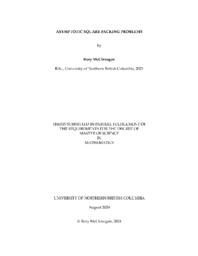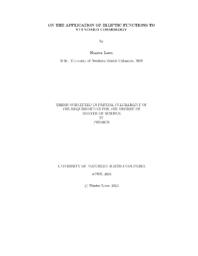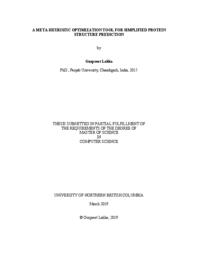Jones, George
Person Preferred Name
George Jones
Related Works
Content type
Digital Document
Description / Synopsis
This thesis provides generalization to known solutions for the scale factor and cosmic time of Friedmann-Lemaître-Robertson-Walker model universes in terms of elliptic functions. In particular the integration of known expressions for the scale factor is used to find new expressions for cosmic time. Various techniques using both the Weierstrass and Jacobi functions are discussed. Plots of physically significant quantities such as redshift and redshift drift are given. Limiting cases provide context for how various cosmic fluids change the dynamics of the universe on the largest scales.
Origin Information
Content type
Digital Document
Description / Synopsis
Quantum computing is a rapidly advancing field of computer science that is increasingly becoming more practical. With these devices becoming more realistic, frameworks are needed by which the hardware resources, both quantum and classical, of quantum computers can be utilized more efficiently. This research aims to fill gaps in the research examining the effectiveness of hardware scheduling on the current generation of quantum computers. A hardware scheduling strategy is implemented using the A* search algorithm for routing qubits to conform with hardware limitations, and this algorithm is tested against a wide variety of quantum programs and devices. The effectiveness of the scheduler is determined through analysis of metrics obtained from the scheduling process. This particular scheduler proved to be effective for most of the tested algorithms and efficient for some, making it useful for general purposes, though some potential sources of improvement could increase the number of algorithms it is efficient for.
Origin Information
Content type
Digital Document
Description / Synopsis
Suicide is a global health issue that involves the biological, social, cultural, spiritual, and psychological state of an individual in addition to many other factors which interact and lead a person to Suicidal Ideation (SI) and Suicide Attempt (SA). Over the last decade, with the advent of large medical databases, there has been a tremendous rise in the use of Business Intelligence (BI) in the healthcare sector. Healthcare uses BI tools to transform raw data into meaningful information to extract the potential value of historical data. Timely diagnoses of mental health problems can assist experts to address it at an early stage and enhance patient’s quality of life. There is a critical need to examine the fundamental psychological well-being issues among the worldwide population, which may develop into more complex issues, if not considered at an early period. This research focuses on two main components: Data visualization and Predictive model. First, a mental health dashboard is created using an end to end approach in which mental health data is pre-processed, integrated, and visualized in the form of several reports. These reports display the aggregated results in visually appealing formats (i.e., graphs, tables, pie charts, and line graphs) and allow navigation to finer granularity reports via drill down and drill through reports. Second, a predictive model is built to forecasts Suicide Attempts (SA). Ontario Mental Health Reporting System (OMHRS) database obtained from CIHI (Canadian Institute for Health Information) is used to train and test the predictive model. This model uses advanced data mining algorithms, including Artificial Neural Networks, Decision trees, and regression. The outcomes of different data mining algorithms are compared with actual values to determine the accuracy of the model. In addition, a web form is created, which takes input from the user and calculates the probability of SA for a given patient. The objective of this research is to provide a better understanding of trends, outliers, and patterns to enable healthcare providers to make more informed decisions and decrease mortality rate due to suicide.
Origin Information
Content type
Digital Document
Origin Information





